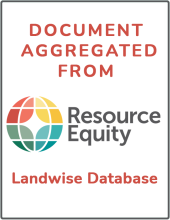Land Library Search
Through our robust search engine, you can search for any item of the over 73,000 highly curated resources in the Land Library.
If you would like to find an overview of what is possible, feel free to peruse the Search Guide.
/ library resources
Showing items 1 through 9 of 61.Effective poverty reduction programs require careful measurement of poverty status. Several studies have shown conceptually that assets reflecting productive capacity form a more robust basis for identifying the poor than do flow variables such as expenditures or income.
This case study draws on research into some of the processes through which people access, hold, and trade land in poorer areas of towns and cities.
The study provides the background and objectives of the Athens workshop, then provides separate in-depth background and analysis of the informal development solutions being adopted in Albania and Greece.
As the world continues to experience a severe food crisis, with over one billion people going hungry, land grabbing – the purchase or lease of land by wealthy, food-insecure nations and private investors from mostly poor, developing nations in order to produce food crops for export – is gaining m
African Governments are planning to leapfrog development and move to a middle income economy in a short time.
Smallholder communities in the Bolivian highlands have managed to conquer hunger: cheese production o? ers great hope to the people of the Peñas Valley. Cheese provides healthy nourishment for their children, generates additional income for families, and stimulates the local economy.
In 2007 Urban LandMark undertook a series of consultations as part of the Voices of the Poor project. Four workshops were held in the centres listed above. The workshops were attended mostly by civil society organisations as well as NGOs.






